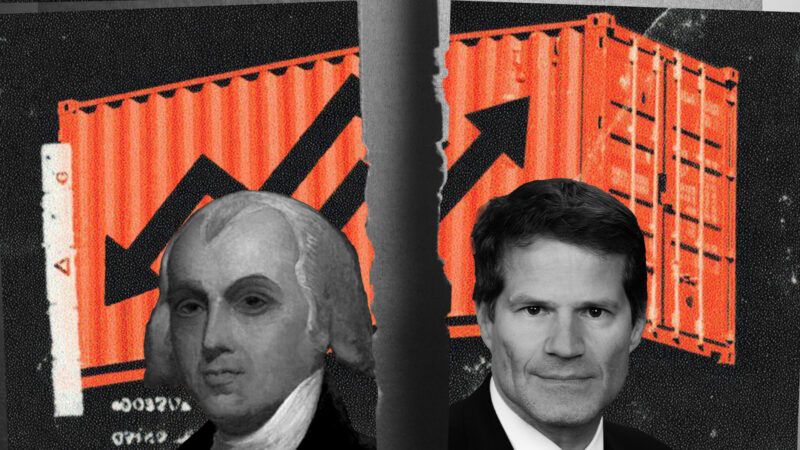Trump's Lawyer at the Supreme Court Cites a Letter from James Madison That Says Tariffs Are Taxes
During oral argument at the Supreme Court, Solicitor General D. John Sauer cited a letter by James Madison that completely undermines the administration’s case that its tariffs are legal.

On Wednesday, the Supreme Court heard oral arguments about the legality of the tariffs that President Donald Trump has implemented under the International Emergency Economic Powers Act (IEEPA). Trump's main argument is that his tariffs are constitutional because they are mere import regulations, authorized by IEEPA, not taxes. This argument has several legal flaws, and even if the administration were able to persuade the justices, the tariffs would still give the president unconstitutional powers.
The illogic of the administration's position was unintentionally revealed by Solicitor General D. John Sauer during a line of questioning from Justice Brett Kavanaugh. When Kavanaugh asked about whether "regulate importation" should be understood to encompass tariffs, Sauer said that, "going back to the time of the Founding, [it] has been understood that the manner in which you regulate importation…is to tariff." To support this claim, Sauer cites "Madison's letter to Cabell."
Sauer was referring to James Madison's September 1828 letter to Joseph C. Cabell, a Virginia state senator, regarding "the constitutionality of the power in [Congress] to impose a tariff for the [encouragement] of Manufactures." To Sauer's point, Madison affirms that the Commerce Clause's "power to regulate trade with foreign nations" includes the imposition of "duties."
However, Sauer and Madison differ on whether duties also invoke the Taxing Clause; Sauer insists that Trump's IEEPA "tariffs are regulatory tariffs…not revenue-raising tariffs." Madison rejects the notion that the two can be parsed.
In his letter to Cabell, Madison says it cannot be inferred "that a power to regulate trade does not involve a power to tax it." Great Britain argued that its tariffs on imports to the American colonies did not amount to "taxation without representation" because they only incidentally raised revenue.
We need not infer from our revolutionary history that the Founders rejected a distinction between tariffs as regulations and tariffs as taxes—Madison reiterates as much, again, in the letter to Cabell. "The Constitution vests in Congress, expressly, 'the power to lay & collect taxes duties imposts & excises'; and 'the power to regulate trade.'" Madison then emphasizes that former power is included in the latter, and that taxes and duties are used synonymously in other clauses. In other words, tariffs that raise revenue are taxes and regulations on foreign commerce.
The Supreme Court recognized the irrelevance of protectionist motives to tariffs' undeniable nature as taxes in J.W. Hampton v. U.S (1928). The Court concluded that one of the "motives in fixing the rates of duty [being to] encourage the industries of this country…cannot invalidate a revenue Act so framed."
Regardless of regulatory motivations, revenue-generating tariffs—which Trump has repeatedly touted his to be—are simultaneous exercises of the Taxing Clause and the Commerce Clause. The Revolutionary War was a recognition of it, Supreme Court precedent affirms it, and Madison says so explicitly in the very letter Sauer cited before the Supreme Court.


Show Comments (38)